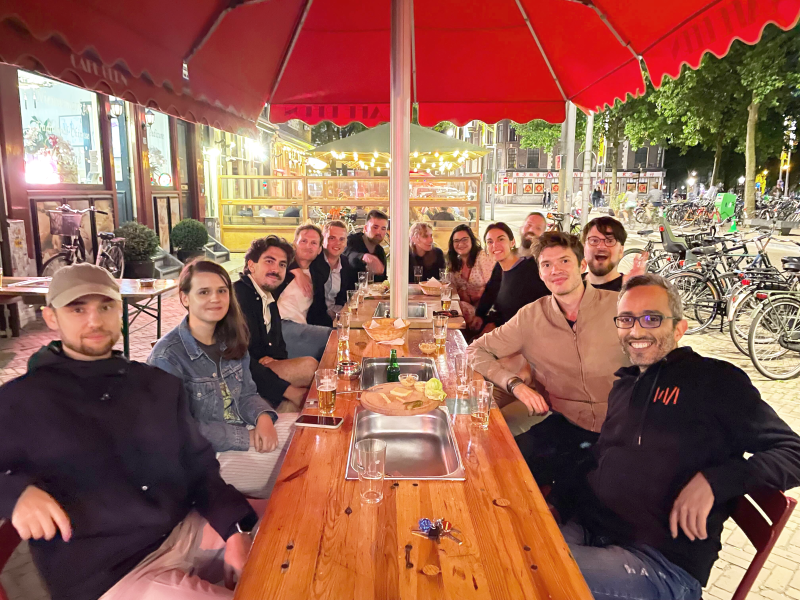What is it Like to Intern at Media Distillery?
Meet Redouane and Ward - our New Machine Learning Engineers!
Late 2021, they started their internship at Media Distillery while writing their thesis for MSc in Artificial Intelligence at the University of Amsterdam (UvA). Both Redouane and Ward now joined our team as Machine Learning Engineers. Let’s hear their story!
The thesis of Redouane: “Recycling Language models, Title generation for Dutch TV-program chapters”
The thesis of Ward: “Video Segmentation Using Multi-modal Transformers to Solve a Set Prediction Problem.”
How did you get to know about Media Distillery?
Redouane: My first contact with Media Distillery was at the UVA Thesis Fair, where I talked with a Media Distillery employee, and then the second meeting was in the Media Distillery office with Bram and Ryan.I was interested in natural language processing, and at Media Distillery I could learn more about it.
Ward:I also found out about Media Distillery through the UvA Thesis Fair. We could either choose to write our thesis at UvA or a company. I had a preference for doing it at a company to gain more practical experience with AI, as the master's degree is highly theoretical. What attracted me about Media Distillery is that most work is done in multidisciplinary teams, so you can see the entire project/product pipeline while working closely with back-end, machine learning, product support, and so on.
How did you come up with your thesis question?
Redouane: The first day I started, I was expecting to work on creating a Dutch version of the GPT-3 model: it is a fairly big, generative English language model. But over the first months of narrowing down the project scope, we figured it was not very achievable. So step by step, we looked into the most useful algorithms and models to support the company products.
Then, we started with chaptering and title generation, which was a very interesting direction to go. The goal was to create a Dutch GPT model for summarization because titling is a form of summarization. After I figured out these models are not the most suitable for summarization, we switched to a different model architecture.
Ward: The project I did was proposed by Media Distillery. The topic was generic content segmentation, which entails splitting a video into different, logical semantic units. These units can be either chapters, scenes, or any other segment depending on the type of content.
When discussing the project with Media Distillery, I especially liked how clearly they explained the relevancy of the project and how it could translate into a potential product. After the Thesis Fair, I was quickly contacted for a follow-up meeting in the office in person, and I even got invited for the upcoming Friday drinks, which was a very nice gesture. Based on this, I decided to choose Media Distillery for my thesis: “Yeah, let's do this. This feels right.”
How many months did it take for you to go from start to finish and when did you join the company?
Redouane: I started my thesis project last year, in November, and the thesis project lasted eight months. It took me longer because I did some teaching assistant work on the side. I handed in my thesis at the end of July, so it was nine months in total. After a 3 month break, I just started as a Machine Learning Engineer this week.
Ward: Originally the internship would take 8 months, which is the expected duration of the thesis. I ended up using one of the two extra months of the ‘grace period’ allowed by UvA. This meant I had to extend my contract with Media Distillery for one additional month. This was not a problem, and I got paid for that month too. After my thesis, I stayed at Media Distillery as a Junior Machine Learning Engineer. It’s been nearly three months already.
What were the most useful skills and knowledge that you gained during this period?
Redouane: During my thesis, I developed more independent work methods: I knew it was all up to me, if I did extra work, or set up extra meetings to ask questions. This helped me become a real independent researcher.
Ward: At Media Distillery I developed many soft skills, like how to work in a multidisciplinary AI team and how to communicate clearly to stakeholders with less technical knowledge.
The entire environment at Media Distillery is sort of geared towards you picking up on soft skills.

Redouane and Ward with the Media Distillery team
What did you think about this internship structure?
Redouane: I think that the biggest problem with large companies is that they expect too much non-thesis-related work from the intern. So interns are often underpaid for doing work that other employees could also do.
I was really glad and happy with the freedom that I got at Media Distillery to work on my project.
At Media Distillery, it was basically up to me to finish my project. Furthermore, they were interested mainly in my research, and not necessarily in my work. This is very positive.
What did you think about your supervisors?
Redouane: They were assigned to us based on the projects we chose, and they proposed the projects themselves.
My supervisor Bram was very approachable, which really helped with the little things. And I could always contact him to think along. I also had a UvA supervisor next to Bram, for more academic questions. For me, it was a nice balance between daily practical support and research-heavy questions.
Ward: Ryan, my supervisor at Media Distillery, did his part really well. From the start, I joined the product teams, because my project was highly related to one of the Media Distillery products. This helped me stay up to date with the company and the relevancy of my project. During my weekly meetings with Ryan, we discussed my progress and bounced ideas back and forth, which helped a lot. All in all, I am very positive about my supervision.
In your opinion, is Media Distillery a good internship place for your major?
Redouane: Because Media Distillery is a small team, there are a lot of options to work on, and you get the freedom to basically do whatever you want, as long as you're providing something interesting.
On the other hand, it is all up to you. So you have to come up with something yourself to make it interesting. Other students with stricter research-heavy internships don't get the same freedom to discover other things.
Ward: It depends on what you are looking for. I fully agree with Redouane here: autonomy is what describes Media Distillery very well. In large companies, teams are often highly specialized, which has its advantages. However, what's nice about Media Distillery is that you learn about the entire AI pipeline from ML operations up to training models and data collection. For me, this was an essential part of AI that is underrepresented in the Master’s program, so the opportunity to combine this with my thesis made Media Distillery the perfect internship place for me.
How would you evaluate your working conditions?
Redouane: I think the work conditions are excellent. I like it a lot. There's a good atmosphere that motivates me to work. The compensation is way above average, you get a lot of freedom.
Ward: The amount of work you take on is really up to you. Of course, you are responsible for your project. Other than work, Media Distillery is a really good place to be. There are lots of company-wide events, and you can easily integrate within the company, even as an intern. Everyone is really welcoming.
If you could improve something in your internship, what would it be?
Redouane: Because I had such an independent project, it was easy for me to pick only the good things from both Media Distillery and UvA. I wasn’t missing anything. Perhaps, to spark an interest and get connected more with the company, it could be helpful to add more concrete onboarding information, about the products they have and the way of working.
Ward: Onboarding was a bit chaotic, which is not unusual for smaller companies. Since the time that I joined, it has already been improved. Other than that, I cannot think of anything I was dissatisfied with during my internship at Media Distillery.
Any tips to share?
Redouane: I had a good chill vibe from the conversation with Bram and Ryan, so I understood that this nice atmosphere is true, not a facade. So my first tip: If it feels good, then it is probably good. And my second tip: Be ready to create your own project, be assertive and proactive.
Ward: My tip would be to use the conversations with Media Distillery at the Thesis fair and any follow-up conversations to find out if there is a match between what you are looking for and what the company is looking for. Everyone at Media Distillery is open to new ideas, so use this freedom to explore if the projects at Media Distillery are in line with your ideas/thoughts for your thesis. If this is the case and you are motivated to make your thesis a success, then you will have a good internship here.
November 3, 2022
